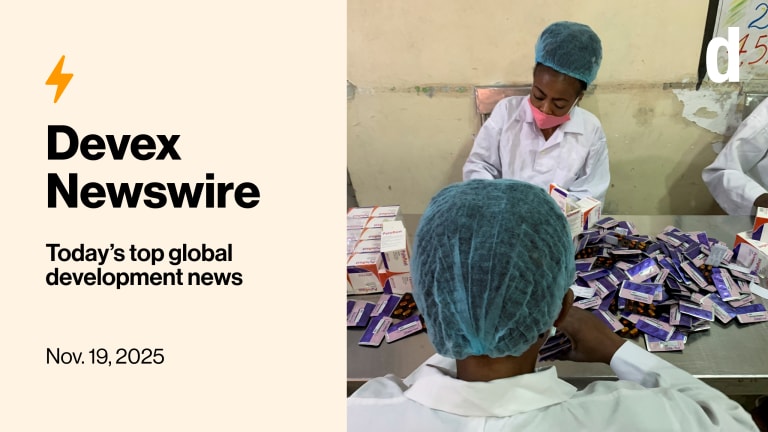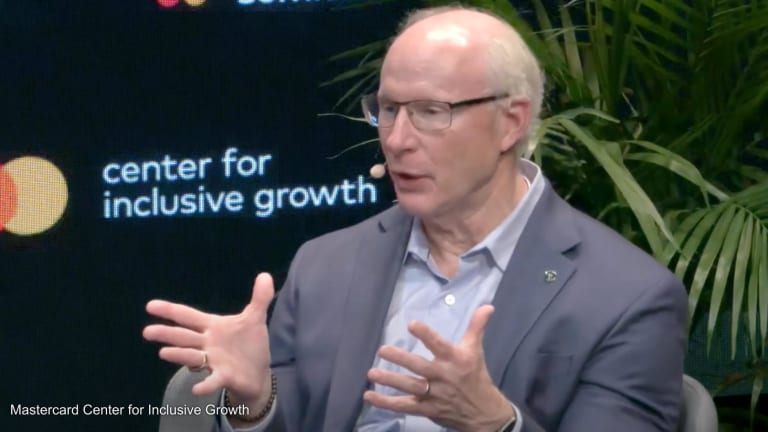How aid organizations navigate rigid ID requirements for customers
Proof-of-identity requirements for access to mobile and financial services can complicate the work of aid organizations. Here's how some are overcoming the challenge.
NAIROBI — In recent years, the humanitarian and development sectors have started to lean more heavily on mobile- and tech-based financial services to increase access to remote populations, make aid more efficient, and heighten financial inclusion. But telecommunication and financial service providers are often prevented from opening accounts — such as for mobile money wallets — for people who can’t prove their identity. That could apply to an estimated 1 billion people globally who do not have government-issued identification. “There's a need to develop systems quite fast to deal with unfolding emergencies and to make payments to displaced populations quickly.” --— Robin Newnham, head of policy analysis, AFI The restrictions are part of global efforts to reduce money laundering and block terrorist financing through “know your customer and customer due diligence requirements” — also known as KYC and CDD requirements — as well as those in place to secure SIM card registration. As these restrictions vary in both policy and practice around the world, those in the aid sector have been forced to adapt to a patchwork of requirements, depending on where they operate. Experts say that working with regulators to increase flexibility, as well as supporting advancements in tech solutions to help verify identity, is key to ensuring that marginalized populations aren’t blocked from accessing services. Requirements hinder access SIM card registration requirements, led by national telecommunication regulators, often mandate the verification of an ID, such as a national ID card, passport, or work permit. Recommendations for KYC and CDD rules, meanwhile, are provided globally by the Financial Action Task Force, an intergovernmental body, to prevent illicit financial activities. National central banks and financial regulators then use these recommendations to determine the rules within their jurisdictions. Humanitarian and development organizations are not subject to these requirements, but the telecommunication and financial service providers they partner with are. Vulnerable people such as refugees and those that are internally displaced “need financial services, but they often don't have access to all the forms of proper documentation anymore because … they’ve picked up and left,” said Andrew Price, vice president of advocacy at World Council of Credit Unions. “Trying to provide financial services to those groups can be a challenge.” On top of a lack of documentation, humanitarian situations come with additional hurdles, such as a need for speed or heightened concerns about terrorist financing around a conflict situation, said Robin Newnham, head of policy analysis and capacity building at the Alliance for Financial Inclusion. “There's a need to develop systems quite fast to deal with unfolding emergencies and to make payments to displaced populations quickly,” he said. “The need to navigate local regulations can be quite challenging.” Governments sometimes issue IDs to displaced people, as does the UN Refugee Agency. In other cases, the responsibility falls on a partnership between the two. But these documents are not always recognized under SIM registration and KYC/CDD requirements. There can also be delays in issuing the documents, and they can quickly expire. Beyond basic identification, the need for documents such as proof of address can also disadvantage rural or disserved populations, or people living in shared households, according to AFI. Strategies for inclusion The Financial Action Task Force has given leeway to national regulators to adapt more flexible approaches to KYC/CDD. It adopted a risk-based approach in 2012 that allows for a tiered structure in which individuals who only show minimal levels of identification can still access financial services with limits, such as transactions below a certain value. “Under that risk-based approach, countries can identify higher-risk categories of clients that need enhanced due diligence, and lower-risk clients and products where they can apply simplified due diligence,” said AFI’s Newnham. “For example, for a mobile money account or for a basic bank account on the phone, there is a transaction limit of a couple of hundred dollars and so [the financial service provider is] not going to require a passport or proof of address.” While a tiered approach can broaden access, it can still leave some people behind. "For some of our beneficiaries, even a light KYC requirement is not feasible," explained Carlos Muñoz, a team lead for the World Food Programme’s SCOPE project, which deals with beneficiary registration. In addition, not all countries have adopted these flexible approaches. “The problem that we find is that national regulators tend to be hesitant to adopt this. They don't want to be the country that lets the terrorists come through,” Price said. “We see that a lot.” That has left the humanitarian and development sectors grappling with varying requirements. In some cases, groups have been able to work with national central banks and telecommunication regulators to make exceptions. Afghanistan’s central bank, for example, authorized mobile money operators to accept forms of certification issued by the U.N. to displaced individuals for SIM registration so UNHCR could provide cash transfers. The Bank of Zambia and the nation’s telecommunications regulator gave special approval to use proof of registration, refugee certificates, and refugee cards for mobile financial services. Bangladesh presents a particular challenge. Rohingya refugees don’t have documentation from Myanmar because the country doesn't recognize them as citizens. The government of Bangladesh also banned the sale of SIM cards to Rohingya refugees, arguing that some were using the internet for criminal activity. As a last resort, WFP provides refugees with vouchers that can only be used at specific retailers. In Somalia, which doesn’t issue national ID cards, the tiered system includes using community leaders to verify the identities of others, according to Rory Crew, finance and systems director at the Somali Cash Consortium. In situations where there are time limits on a person’s presence in a country, such as for emergency transit, UNHCR has distributed SIM cards registered in the organization’s name. In places where KYC and CDD rules are very restrictive, UNHCR might open bank accounts in the organization’s name, with subaccounts under beneficiaries’ names. In other cases, displaced populations rely on locals to register SIM cards and mobile money wallets for them. But this can “put displaced persons in a vulnerable position and increase their chances of being taken advantage of,” according to UNHCR. Developing e-KYC While negotiating exceptions can help, what many advocates really want to see are “legally certain, predictable, and consistently applied” requirements, as UNHCR puts it. In the West African Economic and Monetary Union, for example, KYC requirements have been standardized across the region, but “differences in the specifications of the identity documents create challenges for financial service providers,” according to AFI. Additionally, what is regarded as policy within KYC requirements might not always align with the practices of companies on the ground, Crew said. The Somalia Cash Working Group recently received funding for a mapping exercise that will examine the KYC policies of different telecommunication companies in Somalia to see how consistently these have been implemented with customers. Even when there are not prohibitive requirements, misunderstandings of the requirements can be a barrier to access. “It could be that there is flexibility on guidance from the national regulator, but that may not always be clearly communicated to the bank branch or the frontline staff,” Newnham said. Tech innovations around these requirements, known as e-KYC, have the potential to help. They include strategies such as the use of biometrics, electronic signatures, and documents; data analytics to monitor customer behavior and location of residence; as well as blockchain to create an electronic identity. “You see a lot of activity around allowing for innovation in this area. The use of technology has the ability to help tremendously,” said Price of World Council of Credit Unions. Examples include the issuing of biometric IDs for refugees in Jordan and the Indian government’s Aadhaar program, which is the largest biometric ID system in the world and has helped people open bank accounts and receive welfare payments. But these innovations can also bring new obstacles. "There are challenges in terms of what happens when someone's identity is digital in areas like cybersecurity and data privacy, and the issue of the consumers’ consent and having control over their own data," Newnham said. Last year, for example, India’s Supreme Court ruled that corporate entities can't demand citizens’ Aadhaar ID numbers in exchange for goods or services — causing a headache for banks that had invested heavily in the new system. This year, the Reserve Bank of India reversed this to say the ID numbers can be used, but only with customers’ consent. "We see the direction of travel as going strongly towards e-KYC, where the KYC process can be done electronically using digital identity systems, rather than having to do the whole process face-to-face, which is very time-consuming and adds a lot to compliance costs," Newnham said. "So this is likely to be the direction of travel, but there are going to be challenges."
NAIROBI — In recent years, the humanitarian and development sectors have started to lean more heavily on mobile- and tech-based financial services to increase access to remote populations, make aid more efficient, and heighten financial inclusion.
But telecommunication and financial service providers are often prevented from opening accounts — such as for mobile money wallets — for people who can’t prove their identity. That could apply to an estimated 1 billion people globally who do not have government-issued identification.
The restrictions are part of global efforts to reduce money laundering and block terrorist financing through “know your customer and customer due diligence requirements” — also known as KYC and CDD requirements — as well as those in place to secure SIM card registration.
This story is forDevex Promembers
Unlock this story now with a 15-day free trial of Devex Pro.
With a Devex Pro subscription you'll get access to deeper analysis and exclusive insights from our reporters and analysts.
Start my free trialRequest a group subscription Printing articles to share with others is a breach of our terms and conditions and copyright policy. Please use the sharing options on the left side of the article. Devex Pro members may share up to 10 articles per month using the Pro share tool ( ).
Sara Jerving is a Senior Reporter at Devex, where she covers global health. Her work has appeared in The New York Times, the Los Angeles Times, The Wall Street Journal, VICE News, and Bloomberg News among others. Sara holds a master's degree from Columbia University Graduate School of Journalism where she was a Lorana Sullivan fellow. She was a finalist for One World Media's Digital Media Award in 2021; a finalist for the Livingston Award for Young Journalists in 2018; and she was part of a VICE News Tonight on HBO team that received an Emmy nomination in 2018. She received the Philip Greer Memorial Award from Columbia University Graduate School of Journalism in 2014.








